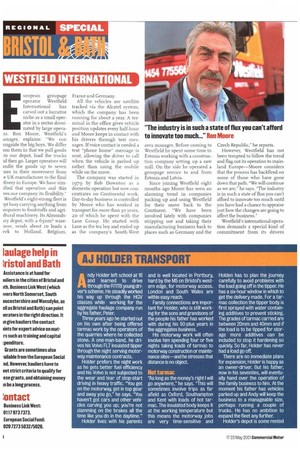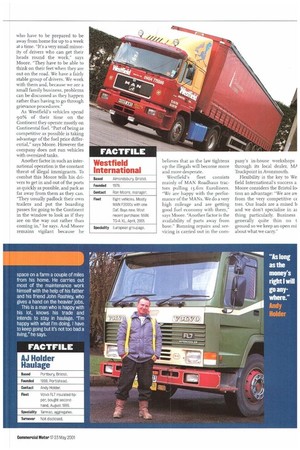AJ HoLDE
Page 40

Page 41

If you've noticed an error in this article please click here to report it so we can fix it.
Andy Holder left school at 16 and learned to drive through the RTITB young driver's scheme. He steadily worked his way up through the HGV classes while working for the aggregate haulage company run by his father, Peter.
Three years ago he started out on his own after being offered tarmac work by the operators of the quarries where he collected stone. A one-man-band, he drives his Volvo FL7 insulated tipper through the night serving motorway maintenance contracts.
Holder prefers the night work as he gets better fuel efficiency and his Volvo is not subjected to the wear and tear of stop-start driving in heavy traffic. "You get on the motorway, get in top gear and away you go," he says. "You haven't got cars and other vehicles carving you up; you're not slamming on the brakes all the time like you do in the daytime."
Holder lives with his parents and is well located in Portbury, hard by the M5 on Bristol's western edge, for motorway access. London and South Wales are within easy reach.
Family connections are important for Holder, who is still working for the sons and grandsons of the people his father has worked with during his 50-plus years in the aggregates business.
His motorway work will often involve him spending four or five nights taking loads of tarmac to motorway construction or maintenance sites—and he stresses that distance is no object.
Hot tarmac "As long as the money's right I will go anywhere," he says. "This will sometimes involve trips as far afield as Oxford, Southampton and Kent with loads of hot tarmac. The insulated body keeps it at the working temperature but this means the motorway jobs are very time-sensitive and
Holden has to plan the journey carefully to avoid problems with the load going off in the tipper. He has a six-hour window in which to get the delivery made. For a tarmac collection the tipper body is first sprayed with water containing additives to prevent sticking. The grades of tarmac carried are between 20mm and 40rnm and if the load is to be tipped for storage more additives can be included to stop it hardening so quickly. So far, Holder has never had a load go off.
There are no immediate plans for expansion; Holder is happy as an owner-driver. But his father, now in his seventies, will eventually hand over the operation of the family business to him. At the moment his father has vehicles parked up and Andy will keep the business to a manageable size, perhaps running a couple of trucks. He has no ambition to expand the fleet any further.
Holder's depot is some rented space on a farm a couple of miles from his home. He carries out most of the maintenance work himself with the help of his father and his friend John Rashley, who gives a hand on the heavier jobs.
This is a man who is happy with his lot, knows his trade and intends to stay in haulage. "I'm happy with what I'm doing. I have to keep going but it's not too bad a living," he says.


































































































